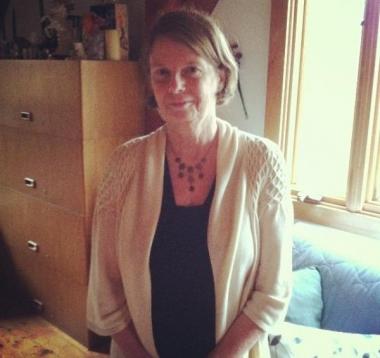
When I was in high school they were trying to track me into, you know, all the lower tracks and track me to –what do you call that—vocational training ‘cause I really didn’t—I always got really, really, really high grades but that was just ‘cause I worked so hard. I didn’t want to go to college. I thought I had enough of this [laughter] aggravation and enough of this kind of, not feeling particularly confident. But my parents said that wasn’t an option, that I was going to college whether I liked it or not, so that was probably a very good decision. So I went to college. I graduated in the top five and with Phi, Phi Beta Kappa so I guess I wasn’t as dumb as everybody thought [laughter] and then I went to the University of Pittsburgh and got my PhD. I would say that my challenges are also something I really in many ways value because I think that when you sort of struggle to understand something you can really explain it better to other people and I feel like I’m really good at that, you know, that I’m a good teacher, that I have a tremendous amount of respect for other individuals who struggle because I did. And I really do think it’s about hard work in large measure [laughs] and, and really, someone who will support you, people who believe in you, and my family believed in me even though, they thought I was kind of stupid [laughs]. And no one, no one ever thought that I would be the one in the family who wound up with a PhD but somehow I did.
Regina Margaret Edmonds was born in 1946 in Bayonne, New Jersey. Jeana was one of three children to the late Richard and Rose McBride Edmonds. As a child, Jeana and her family moved regularly due to her father’s job. In the fifth grade, she moved from Bayonne New, Jersey to Glens Falls, New York and she stayed there until the ninth grade. Her family then moved to Long Island where she graduated as valedictorian of her high school class. Her family moved to a new part of Long Island while she received her undergraduate education from Elmira College. Due to her interest in psychology and her passion to work with children, Jeana got a job at the Devereux School in Rutland, Massachusetts during the summer following her junior year. The subsequent summer she got a job in Rindge, New Hampshire at a school called Hampshire Country School, a school for gifted and emotionally disturbed children. After graduating for Elmira College in the top five of her class with Phi Beta Kappa, Jeana went on to receive her PhD from the University of Pittsburgh and lived there while she worked towards her doctoral degree. During this time she completed her clinical psychology internship in Madison, Wisconsin. Upon completing her doctoral program, Jeana returned to Massachusetts where she reconnected with her husband, Alan Navitski, who she had met while working at the Hampshire Country School in Rindge, New Hampshire. The two soon married and had two children; Alanna Edmonds Navitski and Rielle Edmonds Navitski. Since Al was from Worcester, they decided to remain local and they settled in West Brookfield, Massachusetts. Jeana worked in the Worcester Public School System for two years as a school psychologist and helped run her husband’s bookstore called “The Book Bear” before she applied to be a professor at Assumption College in 1976. She recently retired after working as a professor of Psychology and Women Studies at Assumption for the past 35 years. In this interview, Jeana discusses the struggles she experienced as a young girl who refused to follow the gender norms. She reminds us of the difficulties women faced when applying to college such as the lack of scholarship made available to women and how women were not preferred by colleges. Jeana recalls the various movements of the 1960’s and how she came to discover who she truly was. Jeana also recalls the difficulties of being a working mother, struggling to balance work with child rearing responsibilities especially during a time when maternity leave did not exist. Jeana has very strong political values for which she strongly advocates. She believes firmly in helping not only women but all those who are oppressed. In this interview she describes various issues such as the importance of women having control over their fertility so that they can be equal players in the job market. Furthermore, Jeana describes the inequality and changes she has witnessed in Worcester over the past few decades. Jeana concludes by offering future advice for women.
